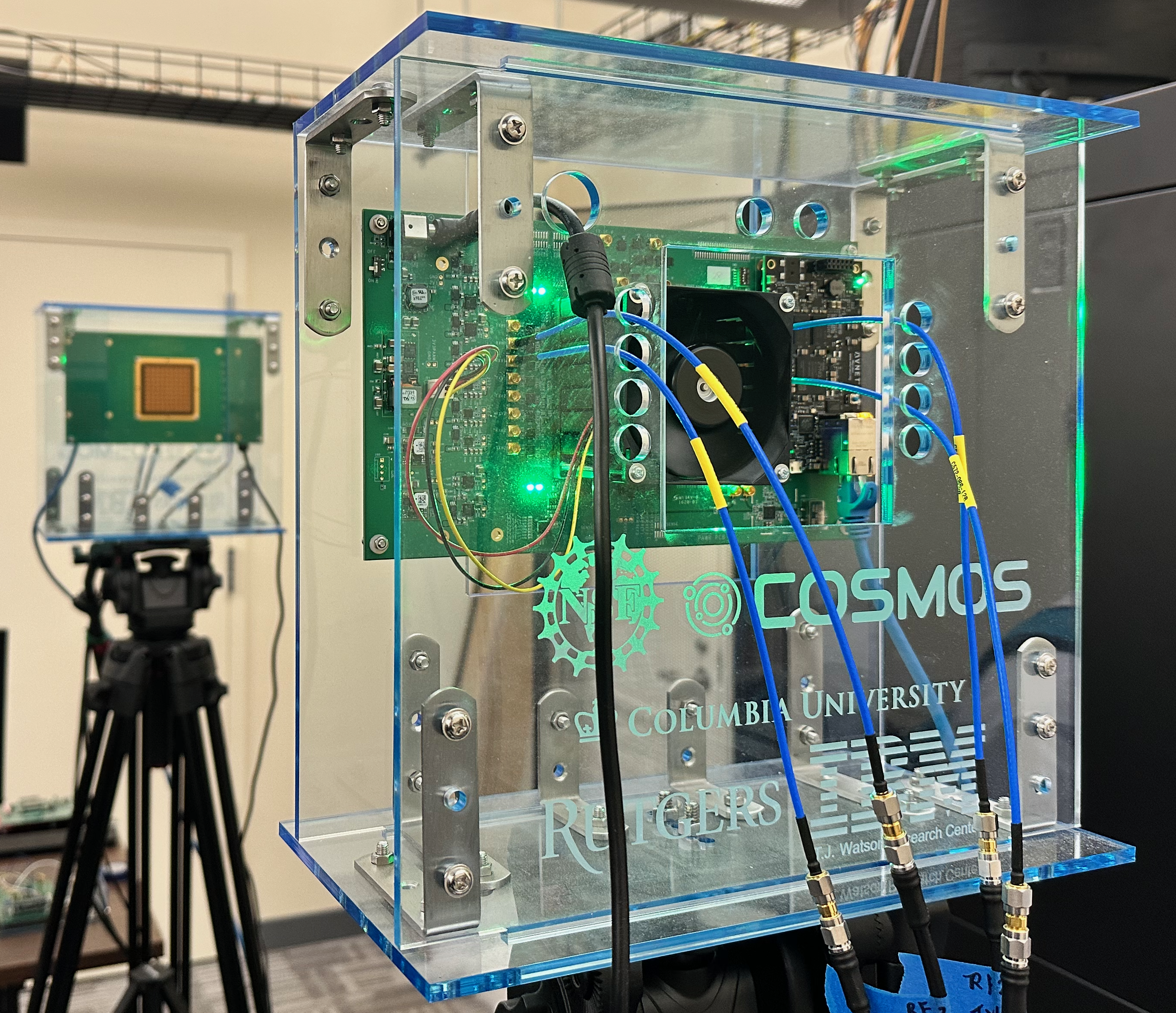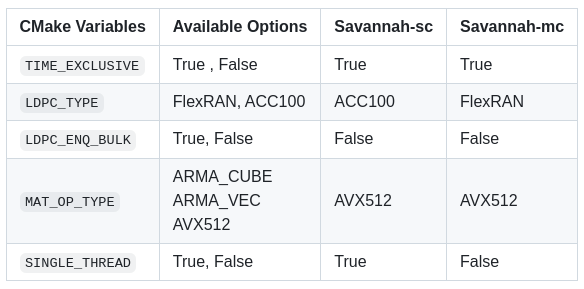| Version 32 (modified by , 17 months ago) ( diff ) |
|---|
Site Navigation
Savannah: Efficient mmWave Baseband Processing with Minimal and Heterogeneous Resources
Description
In this tutorial, we demonstrate Savannah, a framework for efficient mmWave baseband processing with minimal and heterogeneous resources.
- The codebase, README and installation instructions for Savannah software can be found in attachments called
Savannah.zipunder RENEW license. - The COSMOS team contributes to:
- Adding the UHD support for the Agora software under the UHD license;
- Updating DSP pipeline (Equalization; Demodulation);
- Integrating ACC100 BBDEV acceleration for Decoding.
We thank the RENEW team for their support and help throughout the process.
The following papers describes the integration of the IBM 28 GHz PAAMs with Savannah in the COSMOS testbed. We would appreciate it if you cite this paper when publishing results obtained using the PAAMs deployed in COSMOS.
- Z. Qi, Z. Gao, C. Tung, and T. Chen, "Programmable Millimeter-Wave MIMO Radios with Real-Time Baseband Processing". in Proc. ACM Mobi Com'23 Workshop on Wireless Network Testbeds, Experimental evaluation & Characterization (WiNTECH '23), 2023
- Z. Qi*, C. Tung*, A. Kalia, and T. Chen, "Savannah: Efficient mmWave Baseband Processing with Minimal and Heterogeneous Resources". in Proc. 30th Annual International Conference on Mobile Computing and Networking (Mobi Com'24), 2024
Authors:
Zhenzhou (Tom) Qi, Duke University <zhenzhou.qi[at]duke[dot]edu>
Chung-Hsuan Tung, Duke University <chunghsuan.tung[at]duke[dot]edu>
Zhihui Gao, Duke University <zhihui.gao[at]duke[dot]edu>
Tingjun Chen, Duke University <tingjun.chen[at]duke[dot]edu>
Last updated: Sep. 11, 2024
Prerequisites
In order to access COSMOS-SB2, create a reservation in COSMOS testbed and have it approved by the reservation service. Access to the resources is granted after the reservation is confirmed. Please follow the process shown on the COSMOS getting started page to get started.
Resources Required
- 2 USRP N310 SDRs (
sdr1-s1-lg1andsdr1-md1in SB2) - 2 IBM 28GHz PAAMs (
rfdev2-1andrfdev2-2in SB2 ) - 1 Server (
srv1-lg1)
The current hardware connection in SB2 as shown below
sdr1-s1-lg1RF2 TX/RX —rfdev2-1IC0/TX/H,sdr1-s1-lg1RF2 RX2 —rfdev2-1IC1/RX/Hsdr1-s1-lg1RF3 TX/RX —rfdev2-1IC0/TX/V,sdr1-s1-lg1RF3 RX2 —rfdev2-1IC1/RX/Vsdr1-md1RF2 TX/RX —rfdev2-2IC0/TX/H,sdr1-md1RF2 RX2 —rfdev2-2IC1/RX/Hsdr1-md1RF3 TX/RX —rfdev2-2IC0/TX/V,sdr1-md1RF2 RX2 —rfdev2-2IC1/RX/V

|
The required software components used in this demo are already loaded to the <To_be_updated>.ndz node image, the node image includes:
- Ubuntu 20.04, UHD 4.1.0
- PAAM Control to initialize the PAAM boards to integrate with USRPs.
- PAAM CFO calibration.
- Savannah: a framework for efficient mmWave baseband processing with minimal and heterogeneous resources. Please refer to
Savannah.zipunder attachments for more information.
Tutorial Setup
Follow the steps below to gain access to the sandbox console and set up nodes with appropriate images.
- If you don't have one already, sign up for a COSMOS account
- Create a resource reservation on COSMOS SB2
- Login into sandbox console
console.sb2.cosmos-lab.org) with four SSH sessions. - In terminal 1, make sure all the nodes and devices used in the experiment are turned off. Use the following command for SB2
omf tell -a offh -t sdr1-s1-lg1,sdr1-md1,rfdev2-1,rfdev2-2,srv1-lg1
- Load
To_be_updatedon the server.omf load -i To_be_updated -t srv1-lg1 -r 0 - Turn all the required resources on and check the status of all the resources. Use the following commands for SB2.
omf tell -a on -t sdr1-s1-lg1,sdr1-md1,rfdev2-1,rfdev2-2,srv1-lg1
omf stat -t all
sshto the server with option -Y for using GUI for our live demo.ssh -Y root@srv1-lg1
- In all the ssh sessions for
srv1-lg1, use the following to source the correct environment.source /opt/intel/oneapi/setvars.sh --force --config="/opt/intel/oneapi/renew-config.txt"
Find and prepare USRPs
- Upon logging into the server, set up the 10G data interfaces DATA1, DATA2 in terminal 1.
ifconfig DATA1 10.117.1.1 netmask 255.255.0.0 mtu 9000 up ifconfig DATA2 10.118.1.1 netmask 255.255.0.0 mtu 9000 up
sudo sysctl -w net.core.rmem_max=536870912 sudo sysctl -w net.core.wmem_max=536870912
After running the above commands, you should see that the data interfaces have the appropriate IP addresses assigned.
root@srv1-lg1:~# ifconfig DATA1 DATA1: flags=4163<UP,BROADCAST,RUNNING,MULTICAST> mtu 1500 inet6 fe80::1e34:daff:fe42:d4c prefixlen 64 scopeid 0x20<link> ether 1c:34:da:42:0d:4c txqueuelen 1000 (Ethernet) RX packets 21092 bytes 1881634 (1.8 MB) RX errors 0 dropped 19183 overruns 0 frame 0 TX packets 686 bytes 204975 (204.9 KB) TX errors 0 dropped 0 overruns 0 carrier 0 collisions 0 root@srv1-lg1:~# ifconfig DATA2 DATA2: flags=4163<UP,BROADCAST,RUNNING,MULTICAST> mtu 1500 inet6 fe80::1e34:daff:fe42:d4d prefixlen 64 scopeid 0x20<link> ether 1c:34:da:42:0d:4d txqueuelen 1000 (Ethernet) RX packets 21091 bytes 1881530 (1.8 MB) RX errors 0 dropped 19184 overruns 0 frame 0 TX packets 690 bytes 226549 (226.5 KB) TX errors 0 dropped 0 overruns 0 carrier 0 collisions 0
- Run
uhd_find_devicesto make sure that both USRP N310s can be reached:[INFO] [UHD] linux; GNU C++ version 9.4.0; Boost_107100; UHD_4.1.0.HEAD-0-g25d617ca -------------------------------------------------- -- UHD Device 3 -------------------------------------------------- Device Address: serial: 315A35A addr: 10.117.2.1 claimed: False fpga: XG mgmt_addr: 10.116.2.1 mgmt_addr: 10.117.2.1 product: n310 type: n3xx -------------------------------------------------- -- UHD Device 4 -------------------------------------------------- Device Address: serial: 3176DF7 addr: 10.118.3.1 claimed: False fpga: XG mgmt_addr: 10.116.3.1 mgmt_addr: 10.118.3.1 product: n310 type: n3xx
Configure IBM 28GHz PAAM
COSMOS uses the IBM 28GHz PAAM API to configure and initialize the PAAM boards. Under the console in terminal 2, please run the following 4 commands:
<user_name>@console:~$ curl "http://am1.orbit-lab.org:5054/array_mgmt/configure?dev_name=rfdev2-1.sb2.cosmos-lab.org&ics=0&num_elements=16&txrx=tx&pol=h&theta=0&phi=0" <user_name>@console:~$ curl "http://am1.orbit-lab.org:5054/array_mgmt/configure?dev_name=rfdev2-1.sb2.cosmos-lab.org&ics=0&num_elements=16&txrx=tx&pol=v&theta=0&phi=0" <user_name>@console:~$ curl "http://am1.orbit-lab.org:5054/array_mgmt/configure?dev_name=rfdev2-2.sb2.cosmos-lab.org&ics=1&num_elements=16&txrx=rx&pol=h&theta=0&phi=0" <user_name>@console:~$ curl "http://am1.orbit-lab.org:5054/array_mgmt/configure?dev_name=rfdev2-2.sb2.cosmos-lab.org&ics=1&num_elements=16&txrx=rx&pol=v&theta=0&phi=0"
An example message will print out to after each command to indicate that the PAAM board is being successfully configured:
<?xml version="1.0" encoding="UTF-8"?> <response status="OK"> <action service="array_mgmt" name="configure" ipaddr="10.116.5.2"> <step name="open" duration="3.780022"/> <step name="initializaition" duration="0.125465"/> <step name="enabling" duration="0.022732"/> <step name="steering" duration="0.006349" theta="0" phi = "0" ipaddr = "10.116.5.2" /> <state PAAM_ID="0x23" LO_switch="PLL" if_sw1="0xF" if_sw2="0xF" if_sw3="0xF" if_sw4="0xF" txrx="rx" polarization="v" /> <adc> <conv index="0" name="1v2" tADC="114" tVolt="0.279" tCurr="0.139"/> <conv index="1" name="1v5" tADC="214" tVolt="0.523" tCurr="1.046"/> <conv index="2" name="1v8" tADC="4" tVolt="0.010" tCurr="0.005"/> <conv index="3" name="2v7_0" tADC="13" tVolt="0.032" tCurr="0.064"/> <conv index="4" name="2v7_1" tADC="183" tVolt="0.447" tCurr="0.894"/> <conv index="5" name="2v7_2" tADC="18" tVolt="0.044" tCurr="0.088"/> <conv index="6" name="2v7_3" tADC="40" tVolt="0.098" tCurr="0.196"/> <conv index="7" name="3v3_pll" tADC="303" tVolt="0.740" tCurr="0.370"/> <conv index="8" name="5v_uzed" tADC="276" tVolt="0.674" tCurr="0.674"/> <conv index="9" name="12v" tADC="140" tVolt="0.342" tCurr="1.140"/> <conv index="10" name="0V" tADC="0" tVolt="0.000"/> <conv index="11" name="1V8" tADC="735" tVolt="1.796"/> </adc> <step name="status" duration="0.069065"/> <step name="close" duration="0.100179"/> </action> </response>
Experiment Execution - DPDK BBDev Tests
ACC100 Unittests
Notice: COSMOS testbed currently does not have ACC100 card installed in the servers, but we provide unit test code and testcases for your reference if you have installed the card on your own system.
In Savannah.zip, you will find a README file called BBDev_testcase.md. In this file, you will find detailed instructions on the ACC100 system requirements, initialization, configuration, how to run default validation test and how to build your own testcase.
We have provided example testcase w.r.t different MCS in the mcs_enc_dec_pair folder. Inside this folder, you will find encoding and decoding testcases for different MCSs specifically for 5G mmWave FR2 Numeorology-3 100MHz; A program called test_bbdev_perf.c based on DPDK's bbdev program; and expected encoding and decoding test results. Please feel free to contact the author if you have any questions related to how to use ACC100 card.
Experiment Execution
General information
Notice For every terminal you opened up, please run:
source /opt/intel/oneapi/setvars.sh --force --config="/opt/intel/oneapi/renew-config.txt"
We have already built and installed all the necessary packages for running Savannah, please direct to the ~/Savannah/agora-mmwave/ folder. There are different modes we are able to run and the corresponding configurations are shown in the following. To configure to different modes, please direct to <savannah folder>/build, and use cmake .. -D<VAR>=<OPTION>.

|
TIME_EXCLUSIVEshould be always true to ensure the best performance by avoiding unnecessary recording.LDPC_TYPEallows users to select the LDPC decoder: FlexRAN (software) vs. ACC100 (hardware).LDPC_ENQ_BULKdetermines whether OFDM symbols are delayed to push into the ACC100 accelerator at the last uplink symbol for a frame.MAT_OP_TYPEselects the compute scheme for vectorized matrix operations. Only effective whensmall_mimo_accis enabled in.jsonconfig.AVX512is always recommended for performance if supported.ARMA_VECis the vectorized option wrapped by Armadillo, and thus is recommended when avx512 is unavailable.ARMA_CUBEis for research/experiment evaluation only and does not have good performance as expected.SINGLE_THREADdefines if Savannah merges the only worker thread and the main scheduling thread. When it is set to True, the worker thread count is limited to 1 and is merged with the main thread. When it is set to False, Savannah acts as a multi-thread model as Agora, and has a total thread count is woker threads + 1 (scheduling, main thread).
We have also provided executables that can help you to do experiments with Savannah called savannah.sh. We set the default executable configuration to be tddconfig-sim-ul-fr2-mu3-100Mhz.json. You are also able to choose different configurations to run in Savannah/agora-mmwave/files/config/ci.
Simulation Mode: Savannah-mc
In this section, we are going to cover to how to Savannah-mc in simulation mode.
Please double-check the CMake flags in ~/Savannah/agora-mmwave/build directory.
# you are expect to see the following results: root@srv1-lg1:~/Savannah/agora-mmwave/build# cmake ../ -- Using GNU compiler, compiler ID GNU -- Debugging is disabled -- CMAKE_CXX_FLAGS: -std=c++17 -Wall -g -march=native -m64 -O3 -Ofast -DNDEBUG -- CURRENT DIRECTORY: /root/Savannah/agora-mmwave -- CMAKE_CURRENT_SOURCE_DIR: /root/Savannah/agora-mmwave -- Processor supports AVX-512 -- Using FlexRAN's (i.e., not Agora's) AVX512 encoder -- -- ----- Configuration values ----- -- DEBUG: OFF -- RADIO_TYPE: SIMULATION -- LOG_LEVEL: info -- USE_SPDLOG: True -- ENABLE_MAC: False -- ENABLE_CSV_LOG: False -- ENABLE_MAT_LOG: False -- USE_AVX2_ENCODER: False -- ENABLE_HDF5: False -- TIME_EXCLUSIVE: TRUE -- LDPC_TYPE: FlexRAN -- LDPC_ENQ_BULK: False -- MAT_OP_TYPE: AVX512 -- SINGLE_THREAD: False -- -------------------------------- -- -- Enabled SIMULATION radio type -- Enabled SW Intel FlexRAN LDPC Decoding -- LDPC: Sequential Enqueue Mode -- Time-exlusive: Report only timing but not other characteristics -- MAT_OP_TYPE: Enable AVX512 matrix operation -- SINGLE_THREAD: Enable worker thread (use multi-thread model) -- Using spdlog async logger as the default logger -- Build spdlog: 1.11.0 -- Build type: Release -- Disabled Csv/Mat Logger -- Logging level = info. -- Configuring done -- Generating done -- Build files have been written to: /root/Savannah/agora-mmwave/build
In terminal 1, please first generate the binary files by running:
root@srv1-lg1:~/Savannah/agora-mmwave/# ./savannah.sh -g -s
In terminal 1, please execute the following to bring up the UE. UE will first be in standby mode to wait for gNodeB to be brought up.
root@srv1-lg1:~/Savannah/agora-mmwave/# ./savannah.sh -u -s
In terminal 2, please execute the following to bring up the gNodeB.
root@srv1-lg1:~/Savannah/agora-mmwave/# ./savannah.sh -x -s -r
You are expected to see that both the gNodeB and UE start to run. Specifically on the gNodeB side, you are able to see the following example results during the running process:
[32:013004][I] Main [frame 3740 + 0.2467 ms]: Completed LDPC decoding (16 UL symbols) [32:012370][I] Frame 3739 Summary: FFT (16 tasks): 0.00962884 ms (~0.00244206 + 0.00388781 + 0.00192506 ms), CSI (1 tasks): 0.00109823 ms (~0.00014851 + 0.00028384 + 0.000621329 ms), Beamweights (1 tasks): 0.00024467 ms (~2.1534e-05 + 0.000220723 + 0 ms), Equal (16 tasks): 0.0432896 ms (~0 + 0.0373314 + 0.00568367 ms), Demul (16 tasks): 0.00363033 ms (~1.71221e+12 + 0 + 0 ms), Decode (16 tasks): 0.114495 ms (~6.70152e-05 + 0.110071 + 0 ms), Total: 0.172387 ms
where it contains the total elpased time for processing a frame and a breakdown of the CPU time for each DSP stage. Taking the above frame as an example, the total elapsed time for processing frame 3740 is 0.2467ms, and the CPU time spent on doing equalization is 0.0432896ms.
You can either stop the program by enter ctrl+c or wait till the program stops. The
Experiment Execution - RRU Mode: Savannah-mc
Attachments (3)
- cosmos_paam_202406.png (9.6 MB ) - added by 17 months ago.
- CMake_flags.png (35.0 KB ) - added by 17 months ago.
- Savannah.zip (1.6 MB ) - added by 17 months ago.
